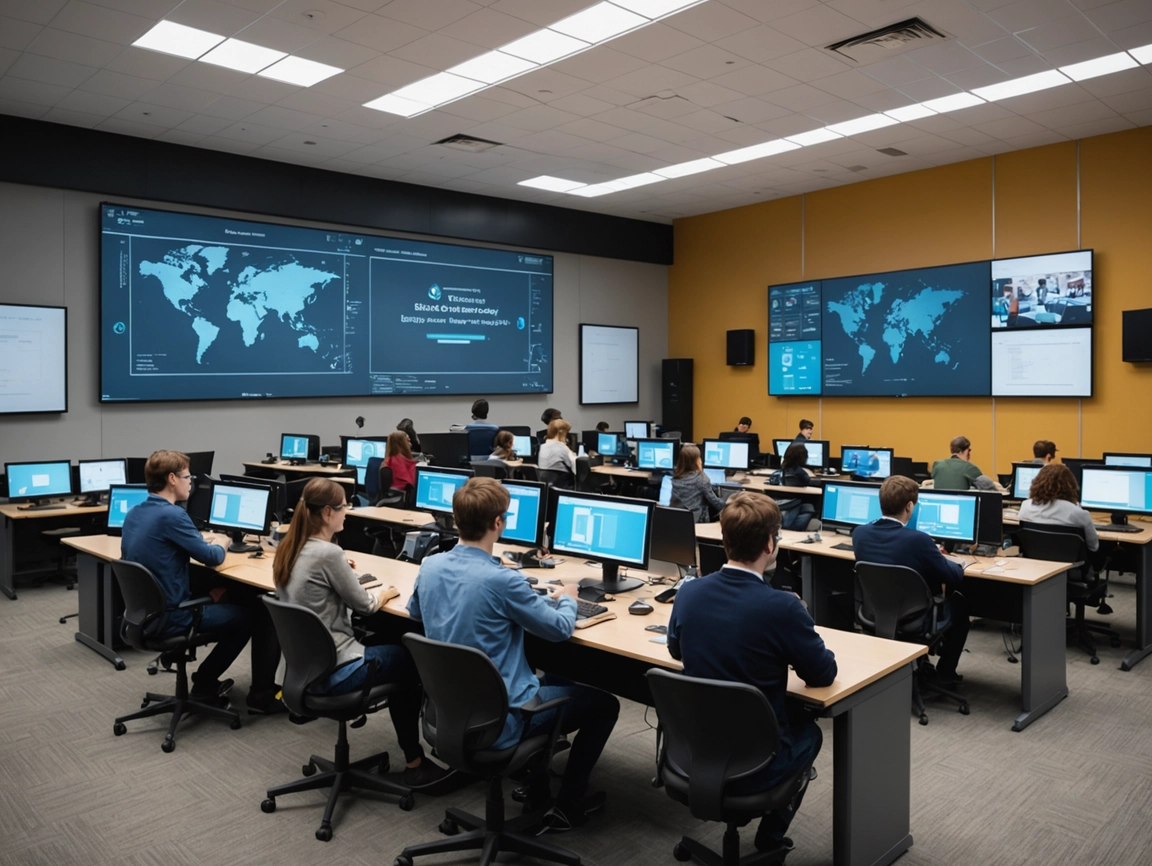Whether you’re new to online classes or an expert distance learner, everyone can benefit from these tips for online learning success. In the era of remote learning and virtual courses, it’s crucial to adapt to the world of distance education and e-learning. The key to achieving top grades lies in effective time management, organization, and motivation. By following these essential strategies, you can navigate the challenges of online learning and achieve your desired grades.
Key Takeaways:
- Effective time management, organization, and motivation are crucial for success in online classes.
- Create a schedule and commit to studying for a designated amount of time each week.
- Prioritize tasks and understand the format of online courses.
- Stay engaged, seek feedback, and make use of office hours and academic resources.
- Take care of yourself by maintaining a positive mindset and practicing self-care.
Create a Schedule and Manage Your Time Wisely

Effective time management is crucial for success in online classes. With the flexibility and convenience of remote learning, it’s important for students to create a schedule and allocate dedicated time for their online class activities. By setting aside specific hours each week for studying or participating in online lectures, students can establish a routine that promotes productivity and focus.
Prioritizing tasks is another essential aspect of time management in online classes. By identifying the most important and urgent assignments or readings, students can allocate their time and energy to the areas that require the most attention. This ensures that deadlines are met and that there is sufficient time to fully engage with the course content.
Understanding the difference between asynchronous and synchronous courses is also important when managing time. Asynchronous courses allow for more flexibility as students can access the material and complete assignments at their own pace. On the other hand, synchronous courses require students to attend live lectures or discussions at specific times. Being aware of the format of the courses helps in planning the schedule accordingly.
Key Strategies for Effective Time Management in Online Classes:
- Create a schedule and commit to studying or participating in online class activities for a designated number of hours per week.
- Identify and prioritize tasks, focusing on the most important and urgent assignments or readings.
- Understand the difference between asynchronous and synchronous courses to plan the schedule accordingly.
- Make smart decisions about how to spend time, balancing academic commitments with personal responsibilities and self-care.
A well-managed schedule allows students to stay organized, meet deadlines, and make the most of their online learning experience. By effectively managing their time, students can establish a sense of structure and control, leading to better academic performance and successful completion of their online courses.
Stay tuned for Section 3: Stay Organized and Be Thorough!
Stay Organized and Be Thorough

Staying organized and being thorough are crucial components of achieving top grades in online college classes. The flexibility of online learning requires students to take initiative and establish a structured approach to their studies. Having a dedicated study space is essential for focusing and minimizing distractions. Whether it’s a quiet corner in your home or a local library, find a space where you can concentrate and avoid interruptions.
Utilizing effective study strategies is another key aspect of staying organized. Creating visual aids like charts, outlines, and study guides can help consolidate and reinforce your understanding of the material. Additionally, breaking down complex information into smaller, manageable chunks can make studying more manageable.
Test-taking strategies are also important to consider. By reviewing past quizzes and tests, you can identify patterns and areas that require further attention. Creating practice exams and simulating test conditions can help you become familiar with the format and pacing, improving your performance when it counts.
Effective Strategies for Staying Organized and Being Thorough:
- Create a dedicated study space free of distractions
- Utilize visual aids like charts, outlines, and study guides
- Break down complex information into smaller, manageable chunks
- Review past quizzes and tests to identify areas for improvement
- Create practice exams to simulate test conditions
“Organization enables you to approach your online classes with a clear and focused mindset.”
By following these strategies, you can enhance your organization skills and develop a thorough approach to your online classes, setting yourself up for academic success.
Remain Engaged Throughout the Whole Course

Active engagement is a crucial aspect of achieving success in online classes. By remaining engaged throughout the entire course, students can maximize their understanding of the material and perform well in their assessments. Here are some tips to help you stay engaged and actively participate in your online learning experience:
- Prepare and review for every lesson: Before each class session, make sure to review the material and come prepared with any questions or areas of confusion. This will allow you to actively participate in discussions and get the most out of the lesson.
- Attend online class sessions: Make an effort to attend all online class sessions and actively participate. This will not only help you stay engaged but also provide opportunities for real-time interaction with your instructor and fellow classmates.
- Take active notes: When taking notes during class or while studying, focus on actively engaging with the material. Use techniques like summarizing, paraphrasing, and asking questions to ensure you’re actively processing the information.
“Active engagement is key to online learning success. By actively participating in class sessions, preparing and reviewing the material, and taking active notes, students can enhance their understanding and retention of the content.”
Review and analyze returned quizzes and tests: After completing quizzes and tests, review them thoroughly to identify areas where you may need additional practice or clarification. Analyzing your mistakes and seeking feedback from your instructor can help you improve and stay engaged with the course material.
Make use of office hours: Take advantage of your instructor’s office hours or virtual appointments to seek clarification, ask questions, and engage in discussions. These one-on-one interactions can provide valuable opportunities for deeper learning and engagement.
By remaining engaged throughout the whole course, you can actively participate in your online classes and maximize your learning experience. Active engagement goes beyond just passively consuming information and plays a vital role in your overall academic success.
Take Care of Yourself

Taking care of yourself is crucial for academic success in online classes. It’s easy to get overwhelmed and burned out when studying remotely, so prioritize self-care to maintain a healthy balance.
Stay Motivated
Keeping yourself motivated is essential for staying on track with your online classes. Remember your goals and the reasons why you chose to pursue your education. Visualize your success and stay focused on the long-term benefits of your hard work. Surround yourself with positive affirmations and find inspiration in the achievements of others.
Cultivate a Positive Mindset
Developing a positive mindset can make a significant difference in your online learning experience. Embrace challenges as opportunities for growth and learning. Instead of being discouraged by setbacks, see them as learning experiences that can help you improve. Cultivate resilience and believe in your ability to overcome obstacles. Adopting a growth mindset will empower you to persist and succeed in your classes.
Practice Self-Care
Self-care is vital for maintaining your overall well-being while studying online. Prioritize restful sleep, nutritious eating, and regular exercise to keep your mind and body in optimal condition. Take breaks when needed and engage in activities that bring you joy and relaxation. Remember to stay connected with loved ones and engage in social interactions, even if they are virtual. Taking care of yourself holistically will enhance your mental clarity, focus, and overall academic performance.
Seek Support
Don’t hesitate to reach out for help when needed. Online learning can sometimes feel isolating, but there are resources available to support you. Take advantage of online forums, discussion boards, and virtual study groups to connect with peers and collaborate on assignments. Utilize your instructor’s office hours and reach out to academic advisors or tutors if you need additional guidance. Remember, seeking support is a sign of strength, and it can make a significant difference in your online learning experience.
Conclusion
In conclusion, achieving academic success in online college classes requires a combination of effective time management, organization, engagement, self-care, and knowing where to find help. By following the tips and strategies provided in this article, students can navigate the challenges of online learning and unlock their full potential.
With dedication, discipline, and a positive mindset, students can achieve top grades in their online classes. By prioritizing their time, staying organized, and remaining engaged throughout the entire course, students can maximize their understanding of the material and perform well in their assessments.
Taking care of oneself is also essential for academic success in online classes. By practicing self-care, maintaining a positive mindset, and adopting a growth mindset, students can overcome challenges and stay motivated. By utilizing available resources and seeking help when needed, students can ensure they are on the right path to achieving top grades.
In conclusion, online learning presents unique challenges, but with the right strategies and mindset, students can succeed. By implementing these tips and strategies, students can not only achieve academic success but also become confident and self-reliant learners in the online education landscape.
FAQ
What are the key tips for success in online learning?
The key tips for success in online learning include effective time management, staying organized, remaining engaged, taking care of oneself, and knowing where to find help.
How can I manage my time effectively in online classes?
To manage your time effectively in online classes, it is important to create a schedule, prioritize tasks, understand the format of online courses, and make smart decisions about how to spend your time.
How can I stay organized and be thorough in my online college classes?
To stay organized and be thorough in your online college classes, you should have a dedicated study space, utilize study tools like charts and outlines, create practice exams, review quizzes and tests, seek feedback, and make use of office hours and academic resources.
How can I remain engaged throughout the whole course in online classes?
To remain engaged throughout the whole course in online classes, it is important to prepare for and review every lesson, attend online class sessions, take active notes, analyze returned quizzes and tests, seek feedback, and engage with peers through online forums and discussion boards.
What self-care tips are important for academic success in online classes?
Self-care tips for academic success in online classes include finding intrinsic motivation, prioritizing rest, nutrition, and exercise, practicing self-talk to reduce anxiety, and scheduling time for personal activities and social connections.
How can I achieve top grades in online college classes?
To achieve top grades in online college classes, you should follow the tips and strategies provided in this article, which include effective time management, organization, engagement, self-care, and knowing where to find help.


